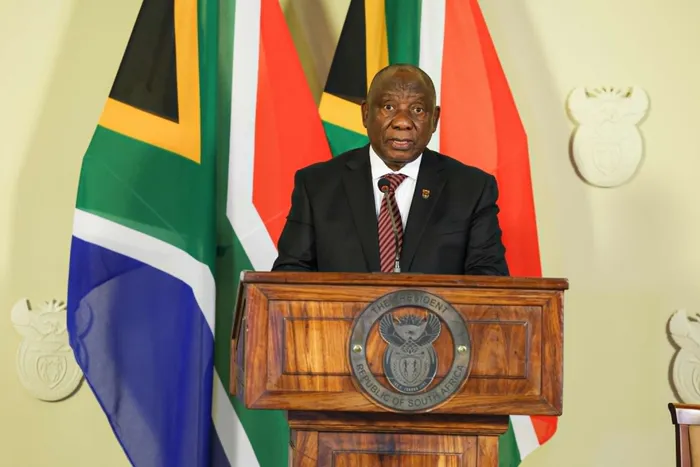
President Cyril Ramaphosa on Friday said ongoing communications between South Africa and US officials have not ceased, adding that the government has submitted a Framework Deal that aims to enhance
Image: GCIS
President Cyril Ramaphosa has announced that negotiations with the United States will continue over the next week in a move signalling the South African government's commitment to safeguarding its trade interests.
This announcement comes in the wake of a decision by the Trump administration to modify the Harmonized Tariff Schedule affecting the tariffs on goods imported to the US economy.
The modifications come as South Africa is bracing for the implementation of a 30% import tariff on its exports to the US.
These reciprocal tariffs, initially due to take effect on 1 August and part of broader measures affecting multiple trade partners, will now take effect from 12h01 eastern daylight time on 7 August 2025.
Notably, all exceptions stipulated in previous US Executive Orders will remain applicable.
This means critical sectors such as copper, pharmaceuticals, semiconductors, and energy products will continue to operate under existing agreements, somewhat alleviating potential pressures on these industries.
This delay is seen as an opportune moment for both nations to explore avenues for compromise and cooperation, as the impact of these tariffs could have sweeping consequences for South African businesses and the economy.
Ramaphosa on Friday said ongoing communications between South Africa and US officials have not ceased, adding that the government has submitted a Framework Deal that aims to enhance mutually beneficial trade and investment relations.
He said all channels of communication remained open to engage with the US and that the government was finalising a relief package designed to assist companies impacted by export restrictions.
“In the meantime, the government is finalising a package to support companies that are vulnerable to the reciprocal tariffs,” Ramaphosa said.
“The package consists of a number of measures to assist companies, producers and workers affected by the tariffs on SA exports to the US. The details of the measures will be announced in due course.”
South Africa exports billions of rands’ worth of goods to the US each year, including fruit, vegetables, meat, and wine.
These sectors employ thousands of workers, and the 30% tariff will render their products uncompetitive in the American market, placing immense pressure on producers and exporters.
Major South African exports to the US include precious stones and metals, motor vehicles, parts and accessories; iron and steel, machinery; aluminium products, ores, organic chemicals, chemical products, nickel products, agricultural products such as citrus fruits, wine, processed foods.
Ramaphosa said South Africa and US trade relations were complementary in nature and South African exports did not pose a threat to US industry. He said South Africa’s exports to the US contained inputs from the African Continent and contributed to intra-Africa trade.
Ramaphosa said South Africa will continue to pursue all diplomatic efforts to safeguard its national interests.
“To this end, the government will intensify its diversification strategy to create resilience of our economy and is working with export councils and industry associations, as well as top exporters to the US with a view to assist with alternative markets.
“In this regard, an Export Support Desk to provide updates on development and provide advisory services to exporters has been established. The details are to be published by the Department of Trade, Industry and Competition on its website.
Regarding the specifics of the trade measures, the US provided clarification that goods already loaded on vessels before the tariffs come into force will be exempt from the additional duties.
This provision aims to allow exporters a window of opportunity to complete shipments without incurring heightened costs, fostering a semblance of normalcy amidst turbulence.
BUSINESS REPORT